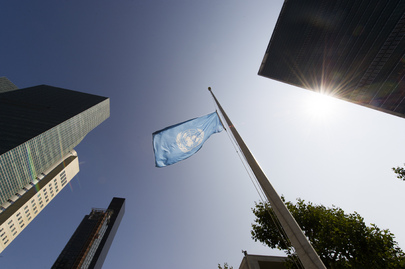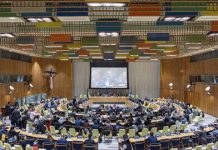Gaza: One in three people going without food for days, warns WFP
The UN World Food Programme says nearly one in three people in Gaza are going without food for days.
A recent assessment shows that 85 per cent of Gaza is now considered an active “militarized” zone.
More than 700,000 people have been displaced since the ceasefire between Israel and Hamas collapsed on 18 March.
Since 21 May – when border crossings partially reopened – WFP has dispatched more than 1,200 trucks carrying over 18,000 metric tons of food into Gaza, as of 5 July.
But the agency says this is still only a “tiny fraction” of what over two million people need to survive.
Carl Skau, WFP’s Deputy Executive Director, called for an urgent ceasefire:
“A ceasefire is urgently needed. We stand ready to deliver – we have the food, the capacity and the systems to assist the entire population in Gaza. During the previous ceasefire, we showed what was possible: delivering over 8,000 trucks of food in only 42 days. We can do it again, but we need all routes and entry points to open, and we need safety and order to be able to reach most vulnerable,” he said.
UN airdrops food supplies in South Sudan’s remote areas
In South Sudan, WFP has resumed emergency airdrops of food and nutrition supplies in Upper Nile state – reaching some of the most remote communities for the first time in more than four months.
Escalating conflict since March has displaced thousands and pushed communities to the brink of famine.
WFP is now reaching more than 40,000 people facing catastrophic hunger. But continued fighting and logistical barriers are making access extremely difficult.
Mary-Ellen McGroarty, WFP’s Country Director in South Sudan, said:
“The link between conflict and hunger is tragically clear…We urgently need to get food to these families, and we are doing everything possible to reach those who need it most before the situation spirals,” she said.
More than one million people across Upper Nile are now facing acute food insecurity. Over 32,000 are already at “catastrophic” levels – triple the number before the violence flared.
Top official calls for inclusive and rights-friendly digital technologies
And in Geneva, UN human rights chief Volker Türk has stressed that human rights must guide the use and development of digital technologies.
Speaking at an event marking 20 years since the landmark World Summit on the Information Society, he urged governments and companies to uphold their obligations to protect the most vulnerable.
Mr. Türk called for efforts to bridge the digital divide, eliminate algorithmic bias, and counter online hate speech.
He also emphasized the need to expand decision-making “beyond a select few” to foster public trust in the digital space.
“We have a window of opportunity to make a difference,” he said, referring to upcoming decisions on AI and data governance, including in UN forums.
Source of original article: United Nations (news.un.org). Photo credit: UN. The content of this article does not necessarily reflect the views or opinion of Global Diaspora News (www.globaldiasporanews.com).
To submit your press release: (https://www.globaldiasporanews.com/pr).
To advertise on Global Diaspora News: (www.globaldiasporanews.com/ads).
Sign up to Global Diaspora News newsletter (https://www.globaldiasporanews.com/newsletter/) to start receiving updates and opportunities directly in your email inbox for free.






























